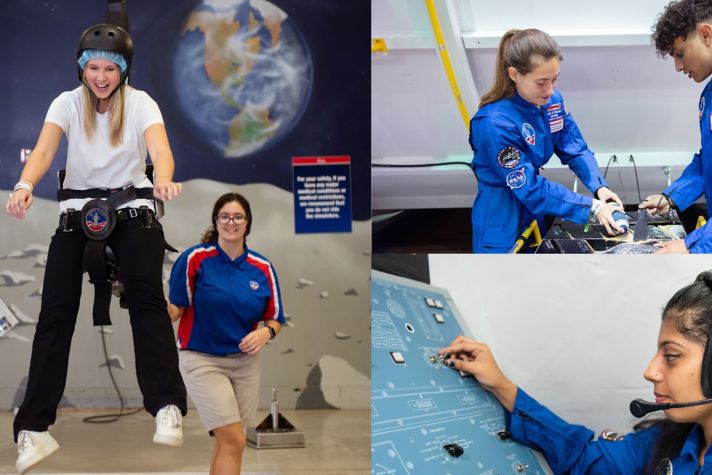-
 Global
Global-
Africa
-
Asia Pacific
-
Europe
-
Latin America
-
Middle East
-
North America
- |
- BUSINESSES
- |
- Contact
- |
-
 Global
Global-
Africa
-
Asia Pacific
-
Europe
-
Latin America
-
Middle East
-
North America
- |
- BUSINESSES
- |
- Contact
- |
You are browsing the product catalog for
You are viewing the overview and resources for
- News
- These Software Ideas for a Better Future Were Dreamed Up by Students
These Software Ideas for a Better Future Were Dreamed Up by Students
Middle and high schoolers developed coding innovations that could improve the lives of families, communities and the homeless
April 11, 2019
What does it take to change the world? Divij Motwani (pictured below), a sixth-grade student from Autrey Mill Middle School in Atlanta, has an idea on how to improve the world for the visually impaired.
That idea won top honors in the first Honeywell STEM Challenge at Georgia Tech, which was the final phase of the STEM Teacher Leadership Program, sponsored by Honeywell Hometown Solutions. Through the program, teachers have been learning how to integrate software education into their classrooms. For this competition, their middle and high school students were challenged to develop coding innovations that could make a difference in society.
Student Divij Motwani demonstrates Blind Sight, which can detect objects from up to 400 feet away
When his team was announced as the winner, Divij and his teammate Pettrus Konnoth pumped their fists as they ran to the stage to collect their prize.
Here are the results of the competition:
First Prize - Blind Sight
School: Autrey Mills Middle School
Grade: Sixth
Teacher: Sharon McGee
The idea: Create an object-detection device for the visually impaired.
How it will work: Equip an ordinary belt with sensors and sounds to notify users how far away an object is.
Why it’s innovative: “The belt is lightweight, easy to use and can detect objects from any range,” said student Divij Motwani, whose inspiration for the project was his uncle, who is blind.
Second Prize - Seatbelt Dispenser
School: Coleman Middle School
Grade: Seventh
Teacher: La Shandia Hill
The idea: Help the elderly and physically impaired more easily fasten their seatbelts
How it will work: At the touch of a button, a motorized dispenser attached to the side of the car seat spools the seatbelt to within a passenger’s reach.
Why it’s innovative: “My grandparents won’t have to reach far to grab the seatbelt,” said student Praneeth Merugu. “They’ll be more willing to use their seatbelts.”
Third Prize - S.A.M. (School Authentication Monitoring)
School: Coleman Middle School
Grade: Seventh
Teacher: LaShandia Hill
The idea: Prevent intruders from unauthorized entry into a school, home or other buildings
How it will work: The intruder detection system uses RFID technology to identify and allow only authorized personnel to enter a building.
Why it’s innovative: “We don’t want dangerous people entering our schools,” said student Riley Hasenstab. “School personnel will know in an instant whether or not someone is unauthorized.”
Student Parv Mahajan shares school shooting stats as part a School Authentication Monitoring project.
Fourth Prize - Delta Force Jacket
School: South Atlanta High School
Grade: Tenth
Teacher: Richard Fox, Jr.
The idea: Create a jacket that insulates users from extreme cold.
How it will work: The inner lining of the jacket is made of thin, flexible Mylar that can be scrolled down in the front and back to protect the body when temperatures dip too low.
Why it’s innovative: “We see homeless people who are out in all kinds of weather,” said student Kevin Freeman. “It would be wonderful to give them extra protection when it’s cold.”
Innovation Award - Fire Bot
School: Autrey Middle School
Grade: Eighth
Teacher: Sharon McGee
The idea: Detect and extinguish home fires.
How it will work: This innovation uses sensors to detect fires and activate a water hose in strategic places where potential fires could start.
Why it’s innovative: “Our idea is similar to a sprinkler system, except that the Fire Bots can be placed closer to potential fire starters, such as a stovetop or fireplace, so that the detection is much faster,” said student Maxwell Wang.
Impact Award - Care Kit
School: Hollis Innovation Academy
Grade: Seventh
Teacher: Nichole Jones
What’s the idea: Access to essential supplies for the homeless
How it will work: A vending machine for homeless shelters dispenses basic needs. Users are given an individualized code that they can punch in to activate the machine.
Why it’s innovative: “It will not only help homeless people gain more dignity, but it might reduce theft as people can get these items for free,” said student Sa'Niya Fallin.
Students at Georgia Tech
Copyright © 2025 Honeywell International Inc.




